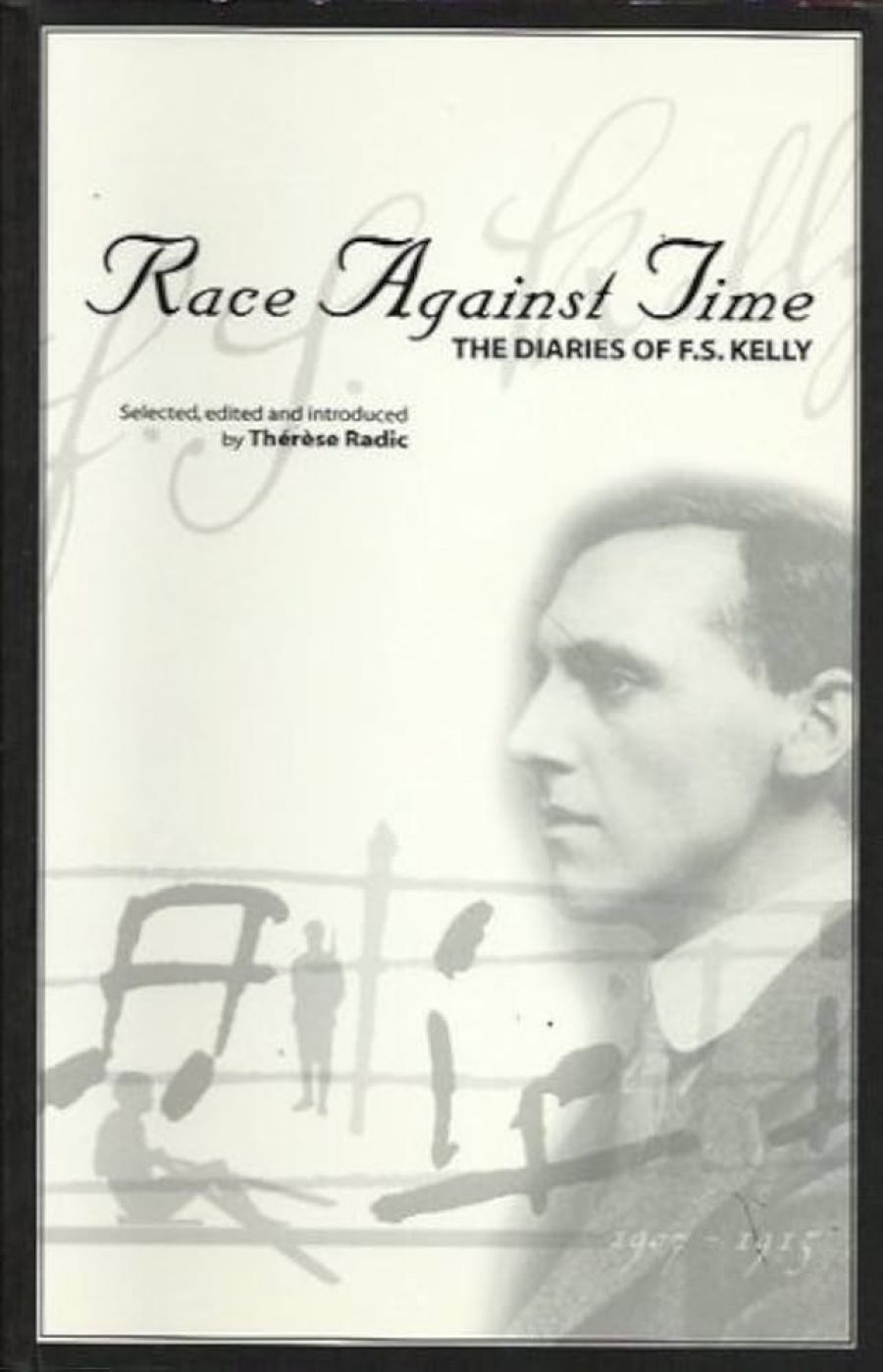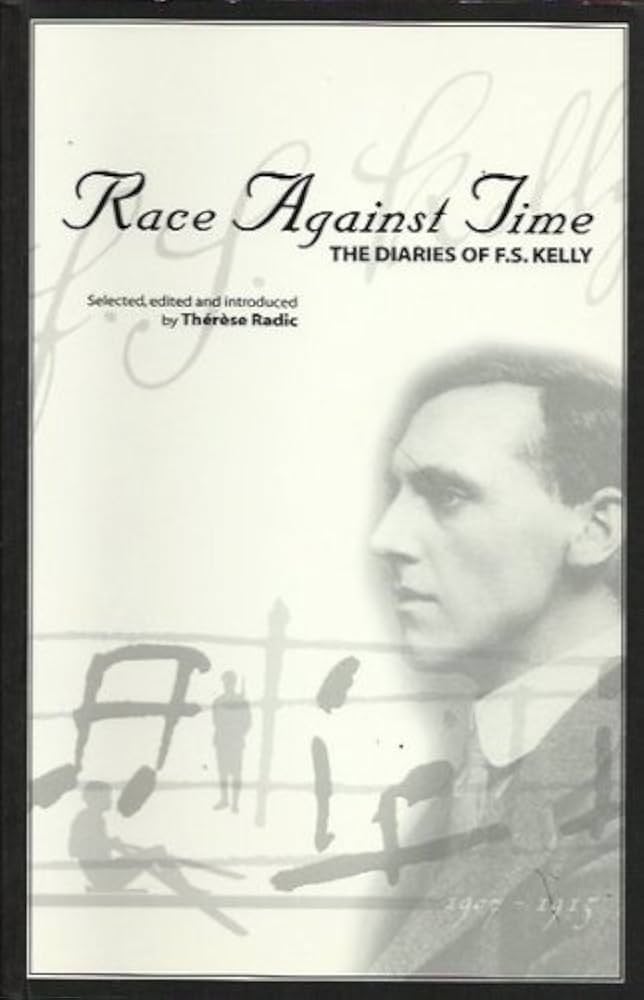
- Free Article: No
- Contents Category: Diaries
- Review Article: Yes
- Article Title: Travels with My Steinway
- Online Only: No
- Custom Highlight Text:
Frederick Septimus Kelly – pianist, composer, Olympic oarsman, gallant officer and Australian – was killed at Beaucourt-sur-Ancre during the final battle of the Somme on 13 November 1916. Only a few weeks before, he had been enjoying ‘the most delightful still bright autumn weather’ and the unexpected loveliness of the French countryside, strangely removed from the booming guns of war. Kelly was then thirty-five. One of the last men to leave the Gallipoli peninsula in January 1916, his bravery in the front trenches before the evacuation had won him the Distinguished Service Cross. As a boy in Sydney, he had demonstrated a precocious musical talent, ‘playing Mozart and early Beethoven piano sonatas before he could stretch the octave’. At the time of his death, this gifted man was moving into what promised to be a new period of fertility and confidence as a composer and performer.
- Book 1 Title: Race Against Time
- Book 1 Subtitle: The diaries of F.S.Kelly
- Book 1 Biblio: National Library of Australia, $29.95 pb, 404 pp
- Book 1 Cover Small (400 x 600):

- Book 1 Cover (800 x 1200):

Poignantly, one of F.S. Kelly’s last compositions was the lovely Elegy for String Orchestra and Harp, dedicated to the memory of the poet Rupert Brooke, who had died in Greece after the onset of an illness in April 1915. Kelly is said to have begun work on this tribute as his friend lay dying nearby. He was among the small group present at the funeral ceremony on Skyros when Brooke was laid to rest in stony ground in a grove of olives. In time, the poet would be honoured as one of the quintessential voices of the Great War. In the nobility of youth cut down in its prime, it is Brooke who stands as one of the enduring symbols of the tragedy and waste of those terrible years of carnage.
But in the memory stakes, Kelly’s fate has been different. For all the shining promise of his sporting and musical careers – and his singular achievements in both – he is today barely recognised in the country of his birth. It is true that, in the specialised field of musical scholarship, honour is given to his work and name. His diaries (1907-15) are preserved in the National Library of Australia, and there is a small notice of his life in the Australian Dictionary of Biography. But in a country that especially celebrates its sporting heroes, who remembers the young Australian whose sculling ‘was beautiful to see’ and who rowed as a member of the veteran English crew that took Olympic gold in 1908? It was said of Kelly that he had sculled as he had rowed, with a natural sense of poise and rhythm that made his boat a living thing under him, always perfectly in control.
Part of the problem for Kelly has been the tenuous nature of his connection to Australia. While a family base remained in Sydney, Kelly himself was educated at Eton and at Oxford. His later training as a musician took place in Europe, and his sporting and professional lives were nourished in England. Indeed, he came to be regarded as one of the most promising English musicians of his day. Bringing his own Steinway piano with him, he made a brief return to Australia in the summer of 1911 and made his début as a concert performer in Sydney. But for all the pleasure he took in rediscovering the bushland, the harbour foreshores and the beaches he had known and loved as a boy, he had built a sophisticated and highly civilised life in England, with music sitting always at the centre of his interests and his friendships. Anchored off Gallipoli in April 1915, Kelly wrote dispassionately as an observer, not a compatriot: without identifying with them, he noted simply that the Australians had behaved heroically in winning their precarious footing.
In her skilful and sensitive editing of Kelly’s diaries, Thérèse Radic has retrieved for Australians the two rich skeins of a remarkable life. She – and Kelly – give us the extraordinary abilities of the sportsman sitting together with a sophisticated and deeply sensitive engagement with the world of music. But the diaries themselves are plain and curiously understated. They are written with a modesty and decency that is, in the end, their most pleasing quality. As Radic observes, the contents of the diaries are neither consciously literary nor aimed at posterity: there is nothing in them of the confessional, nothing sexual and very little ‘of the heart’. Kelly’s passion is for music. In another of the paradoxes of war, Kelly plays his own Steinway on board ship anchored off Cape Helles in the Dardanelles in the days of the Australian blooding on the heights above Anzac Cove. On the evening of 26 April 1915, he played a Scarlatti sonata, Chopin’s F minor Ballade and some of his own studies. Here, in his greatest race, the ‘race against time’, we may see that Kelly achieved something close to sublimity, the assertion of civilised values as the world teetered on the edge of madness.


Comments powered by CComment